As a gamer or someone who needs an energy boost, you may have come across G Fuel, a popular energy formula drink.
G Fuel energy drink has gained a loyal following due to its ability to provide energy, focus, and endurance without the sugar and calories found in traditional energy drinks.
But how much caffeine is in GFuel, and is it the right choice for you?
In this comprehensive article, we’ll explore the ins and outs of G Fuel, including its caffeine content, benefits, potential risks, and more.
Quick Key Takeaways
- G Fuel is a powdered energy formula designed for gamers and those needing an energy boost.
- The caffeine content in G Fuel varies depending on the product, with 150 mg per serving in the powdered formula and 300 mg per can in the canned version.
- Caffeine in G Fuel can provide numerous benefits, such as increased energy, focus, and endurance.
- It’s essential to consume G Fuel responsibly to avoid potential risks associated with excessive caffeine intake.
Understanding G Fuel: What is it?
G Fuel is a powdered energy formula created by Gamma Labs, a company based in Long Island, New York City.
Designed with gamers and busy individuals in mind, G Fuel aims to provide users with a burst of energy, enhanced focus, more energy metabolism and improved endurance without the sugar crash commonly experienced with other energy drinks.
G Fuel comes in various flavors, each containing the same amount of caffeine per can or serving.
The drink has become increasingly popular among gamers, athletes, and professionals who need a quick pick-me-up during long work sessions or intense training.
Looking for a review of GFuel? Check out the complete in-depth review: https://gamingrebellion.com/energy-drinks/gfuel-review/
How Much Caffeine is in G Fuel?
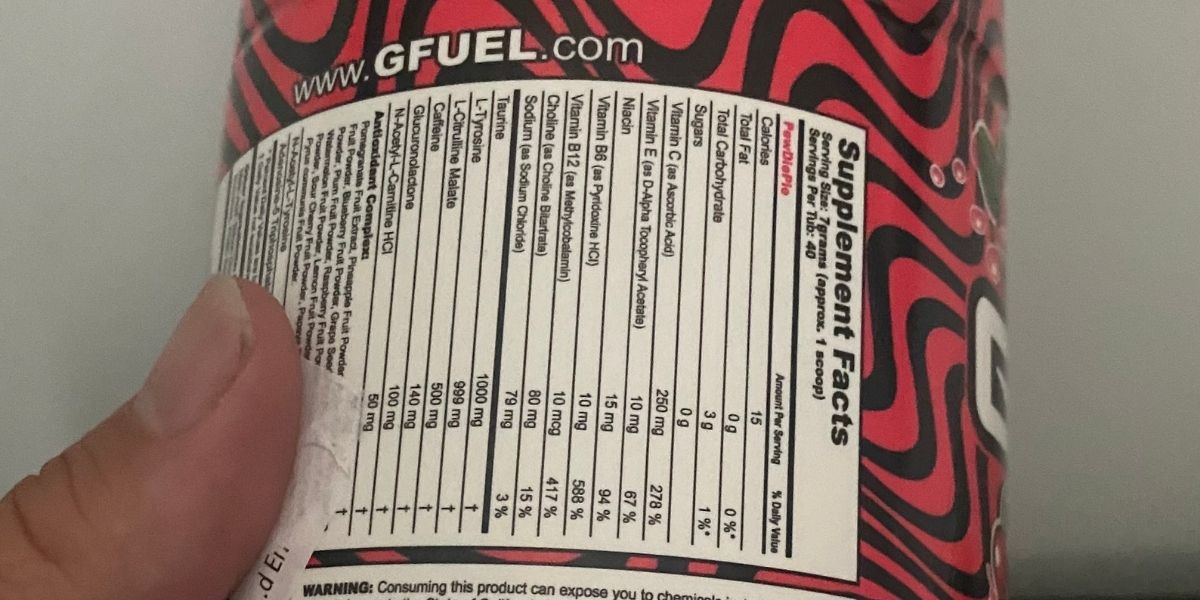
G Fuel’s caffeine content varies depending on the product. The powdered energy drink with formula contains approximately 150 mg of caffeine per serving, while the canned version has around 300 mg per can.
To put these numbers into perspective, a standard 8-ounce cup of coffee typically contains 95 mg of caffeine.
When comparing G Fuel’s caffeine content to other popular energy drinks however, it falls within the average range.
For example, a can of Red Bull has 80 mg of caffeine, while a can of Monster Energy contains about 160 mg.
Benefits of G Fuel and Why to Use It
G Fuel offers several benefits that make it an attractive choice for those seeking an energy boost:
- Sugar-free: G Fuel is sugar-free, making it a healthier alternative to traditional energy drinks that are often loaded with sugar and calories.
- Variety of flavors: With a wide range of flavors available, users can enjoy a new taste experience every time they consume G Fuel.
- Convenient and portable: The powdered formula is easy to mix with water, allowing users to create their energy drink on-the-go.
- Cost-effective: G Fuel is typically more affordable than other energy drinks on the market, especially when purchased in bulk.
Comparing G Fuel Caffeine Content with Alternatives
To give you a better idea of how G Fuel stacks up against other energy-boosting options, let’s compare its caffeine content with some alternatives:
- Coffee: As mentioned earlier, a standard 8-ounce cup of coffee typically contains 95 mg of caffeine. However, this amount can vary greatly depending on the type of coffee beans, brewing method, and serving size.
- Tea: Tea is another popular source of caffeine, with an average 8-ounce cup containing between 20 and 60 mg. Like coffee, the caffeine content in tea can vary depending on the type of tea leaves and the brewing process.
- Energy shots: Energy shots, such as 5-Hour Energy, are concentrated liquid supplements designed to provide a quick boost of energy. A single serving of 5-Hour Energy contains about 215 mg of caffeine.
- Pre-workout supplements: Pre-workout supplements are designed to enhance exercise performance and often contain caffeine as an active ingredient. The caffeine content in pre-workout supplements can vary widely, with some products containing as little as 100 mg per serving and others exceeding 300 mg.
- Caffeine pills: Caffeine pills are another option for those seeking an energy boost. These supplements typically contain 100-200 mg of caffeine per tablet, providing a controlled and precise dose of caffeine without additional ingredients found in energy drinks or coffee.
When considering which energy-boosting option is right for you, it’s essential to evaluate your individual needs, preferences, and caffeine tolerance.
G Fuel is an attractive choice for many, thanks to its sugar-free formula, wide variety of flavors, and convenient powdered format.
However, always remember to consume your G Fuel powder and other caffeinated products responsibly to avoid potential risks associated with excessive caffeine intake.
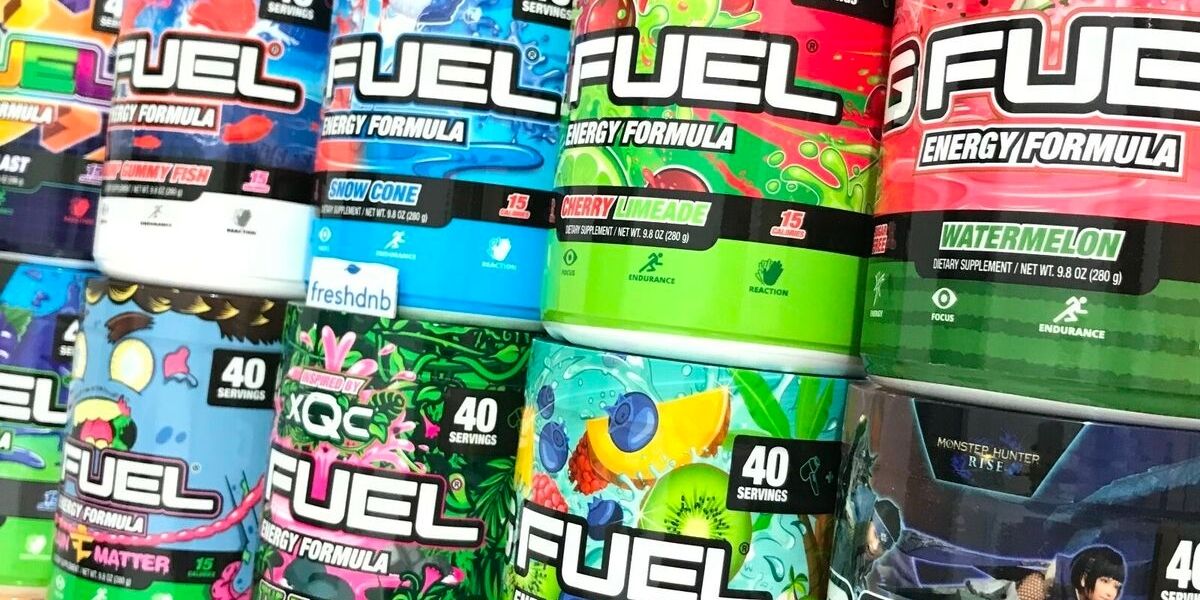
G Fuel Ingredients and Nutritional Information
Understanding the ingredients and nutritional profile of G Fuel can help readers make informed decisions about its consumption.
In addition to caffeine, G Fuel contains various vitamins, amino acids, and antioxidants, which contribute to its energy-boosting and focus-enhancing effects. Some key ingredients include:
- Taurine: An amino acid that may improve athletic performance and mental focus.
- L-Tyrosine: Another amino acid that can enhance cognitive function, especially during times of stress.
- Choline bitartrate: A compound that supports brain health and may improve memory and focus.
- Green tea extract: A source of natural caffeine and antioxidants, which can increase energy levels and provide numerous health benefits.
- Vitamins C, E, B6, and B12: Essential vitamins that support overall health and immune function.
G Fuel is sugar-free and contains only 25 calories per a serving of g fuel in its powdered form, making it a healthier alternative to traditional energy drinks.
The Science Behind Caffeine and Energy
Caffeine is a natural stimulant found in various plants, such as coffee beans, tea leaves, and cacao pods.
When consumed, it works by blocking adenosine receptors in the brain, which are responsible for promoting feelings of relaxation and drowsiness.
By blocking these receptors, caffeine can help increase alertness, focus, and energy levels.
In addition to its stimulating effects, caffeine has been shown to have other potential benefits, such negative effects such as:
- Antioxidant properties: Caffeine is a natural antioxidant, which means it can help protect cells from damage caused by free radicals.
- Metabolism boost: Caffeine can slightly increase your metabolism, helping you burn more calories throughout the day.
- Pain relief: Some studies suggest that caffeine may help reduce pain, particularly when combined with other pain-relieving substances like acetaminophen or aspirin.
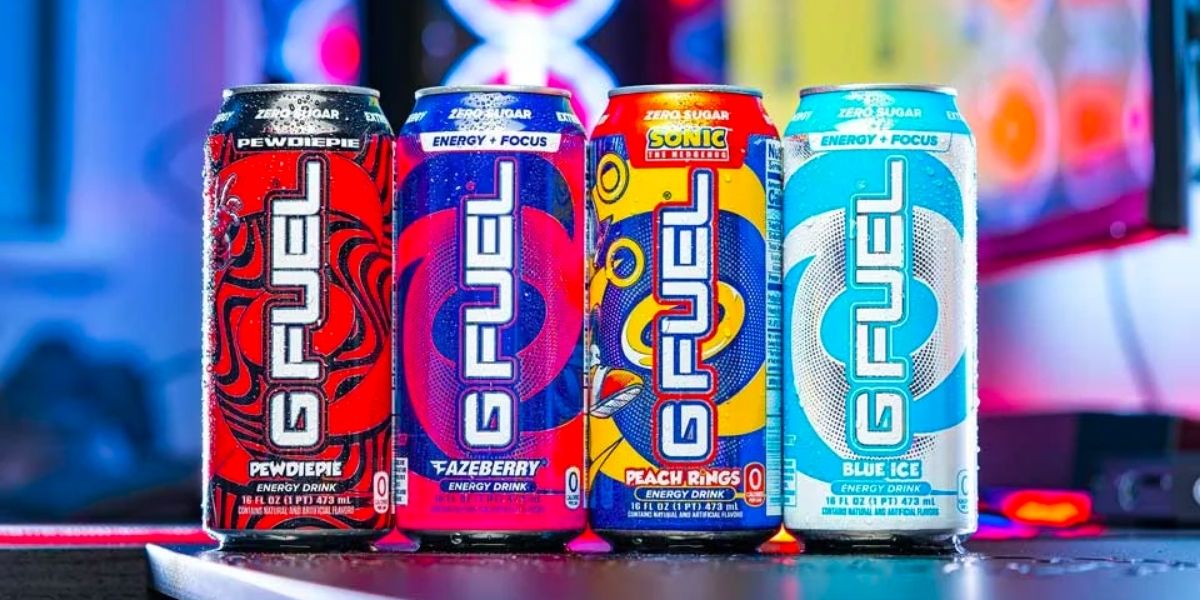
The Benefits of Caffeine in Energy Drinks
Caffeine is a key ingredient in many energy drinks, including G Fuel. Some essential benefits of caffeine in energy drinks like G Fuel include:
- Boosting energy levels: Caffeine stimulates the central nervous system, helping you feel more alert and awake.
- Enhancing focus and concentration: Caffeine can improve cognitive function, allowing you to concentrate better on tasks and react more quickly.
- Improving physical performance: Caffeine has been shown to increase endurance and reduce fatigue during physical activities.
Potential Risks of Caffeine Consumption
While caffeine can provide numerous benefits, excessive consumption can lead to health concerns.
Some potential risks associated with too much caffeine include:
- Increased heart rate and blood pressure: High caffeine intake can cause your heart to beat faster and raise your blood pressure.
- Sleep disturbances: Consuming caffeine close to bedtime may make it difficult to fall asleep or stay asleep.
- Dependency and withdrawal symptoms: Regularly consuming large amounts of caffeine can lead to dependence, and suddenly stopping can cause withdrawal symptoms such as headaches, fatigue, and irritability.
It’s essential to know your caffeine limits and consume G Fuel and other caffeinated products responsibly.
Tips for Responsible Caffeine Consumption
To enjoy the benefits of caffeine in G Fuel and other energy drinks without experiencing negative side effects, consider these tips for responsible caffeine consumption:
- Know your limits: Be aware of your personal tolerance for caffeine and adjust your intake accordingly. Most experts recommend limiting daily caffeine consumption to no more than 400 mg for adults.
- Time your caffeine intake: To avoid sleep disturbances, try to consume caffeinated beverages earlier in the day or at least several hours before bedtime.
- Stay hydrated: Caffeine can act as a mild diuretic, which means it may increase urine production. Make sure to drink plenty of water to stay properly hydrated.
- Monitor your overall caffeine intake: Remember that caffeine is found in many foods and beverages, including chocolate, tea, and some medications. Keep track of your total daily caffeine intake to ensure you’re not consuming too much.
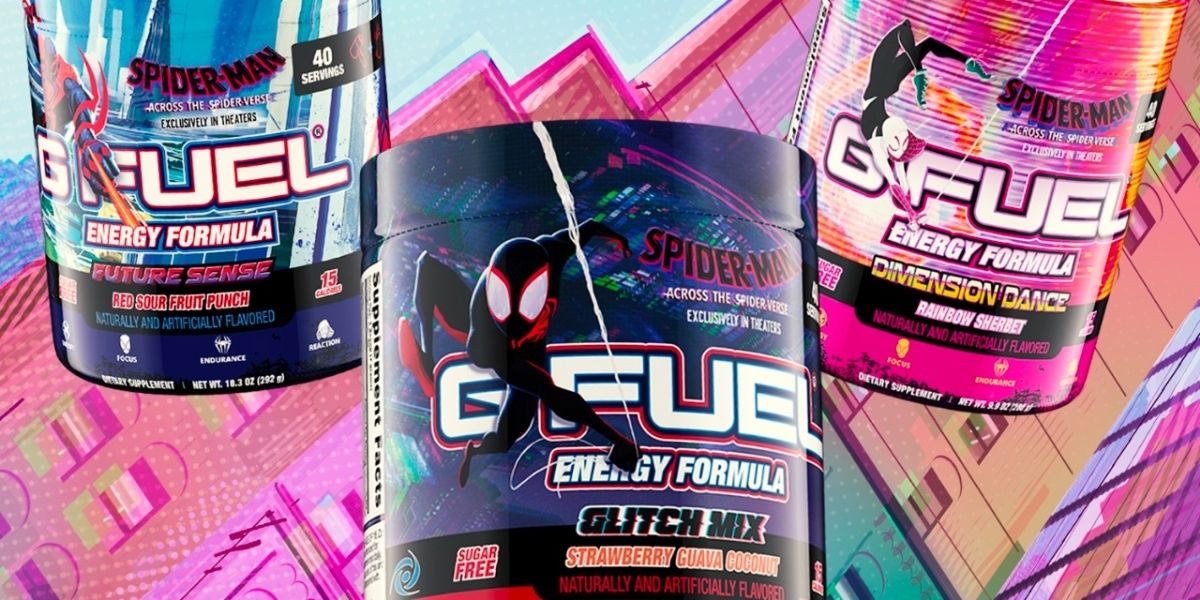
Tips for Choosing the Right Energy Drink or Supplement
With countless energy drinks and supplements available on the market, it can be challenging to determine which one is right for you. Here are some tips to help you choose the best option:
- Consider your caffeine tolerance: Be aware of your personal tolerance for caffeine and select a product with a caffeine content that suits your needs.
- Examine the ingredient list: Look for products with natural ingredients, minimal artificial additives, and a low sugar content.
- Assess your dietary preferences and restrictions: If you have specific dietary needs or preferences, such as being vegan or avoiding gluten, ensure the product you choose aligns with those requirements.
- Read reviews and testimonials: Research what other users have experienced with the product to gain insight into its effectiveness and potential side effects.
- Consult with a healthcare professional: If you have concerns or pre-existing health conditions, it’s always best to consult with a healthcare professional before starting any new supplement or energy drink.
By keeping these tips in mind, you can make an informed decision when selecting an energy drink or supplement that best suits your needs and preferences.
Final Thoughts
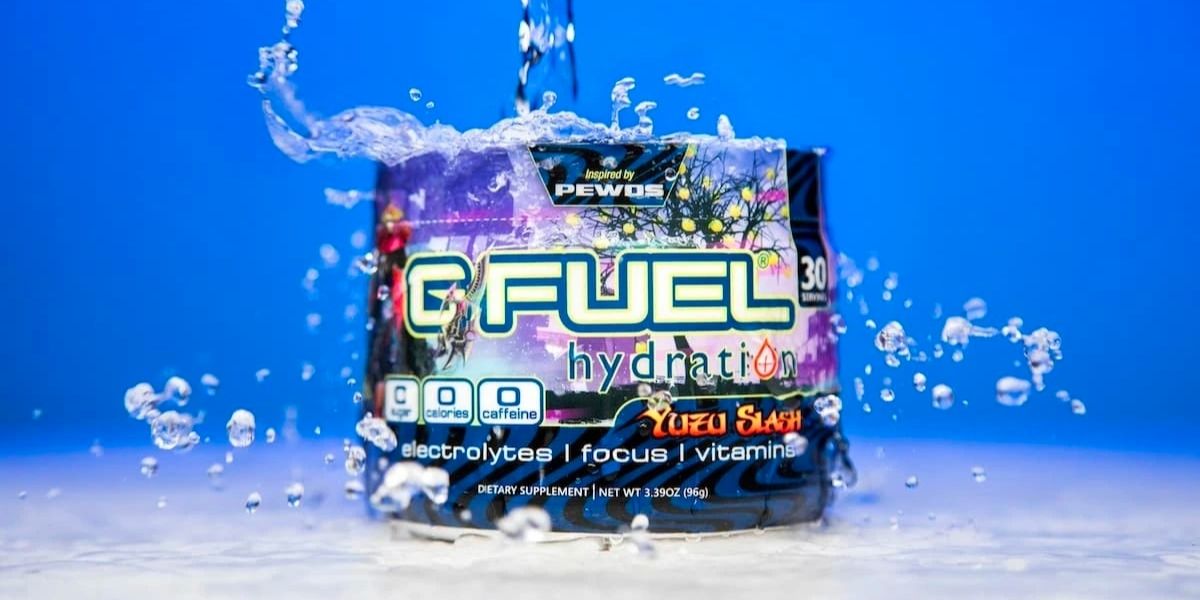
G Fuel is a popular energy formula drink that offers a convenient and healthier alternative to traditional energy drinks.
With varying amounts of caffeine depending on the product, G Fuel provides numerous benefits such as increased energy, focus, and endurance.
However, it’s essential to consume G Fuel responsibly and be aware of potential risks associated with excessive caffeine intake.
By considering non-caffeinated alternatives if you’re sensitive to caffeine and following tips for responsible consumption, you can enjoy the benefits of G Fuel energy, and other caffeinated beverages without experiencing negative side effects.
FAQ
How does G Fuel’s caffeine content compare to coffee or other energy drinks?
G Fuel contains more caffeine than an average cup of coffee and falls within the average range for energy drinks. The powdered formula has 150 mg of caffeine per serving, while the canned version contains 300 mg.
Can I consume G Fuel if I’m sensitive to caffeine?
If you’re sensitive to caffeine, it’s best to avoid G Fuel or opt for a non-caffeinated alternative. Always listen to your body and consult with a healthcare professional if you have concerns.
How long does G Fuel’s energy boost last?
The duration of G Fuel’s energy boost can vary depending on individual factors such as metabolism, caffeine tolerance, and sensitivity. On average, users may experience an energy boost lasting between 4-6 hours.


